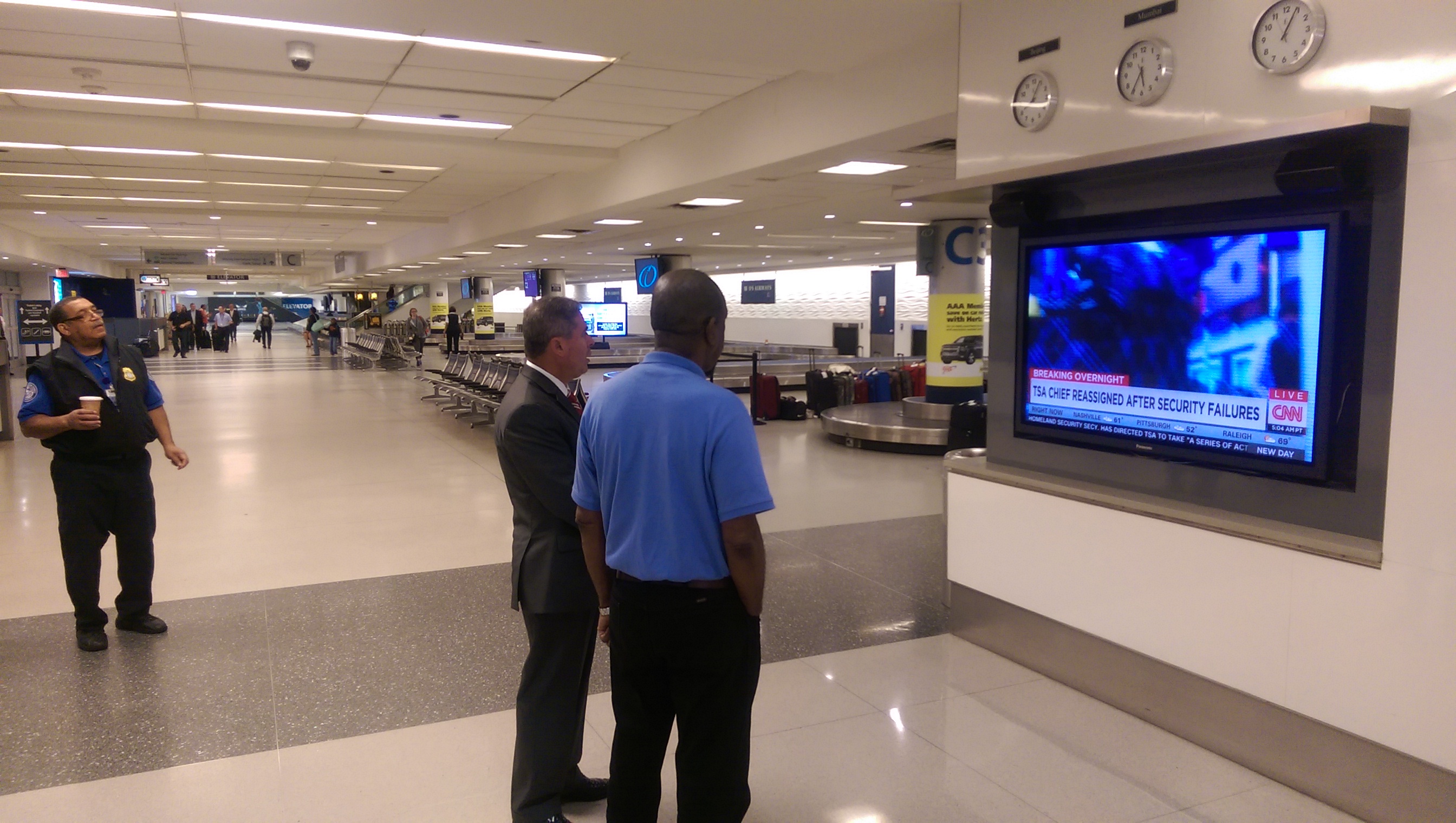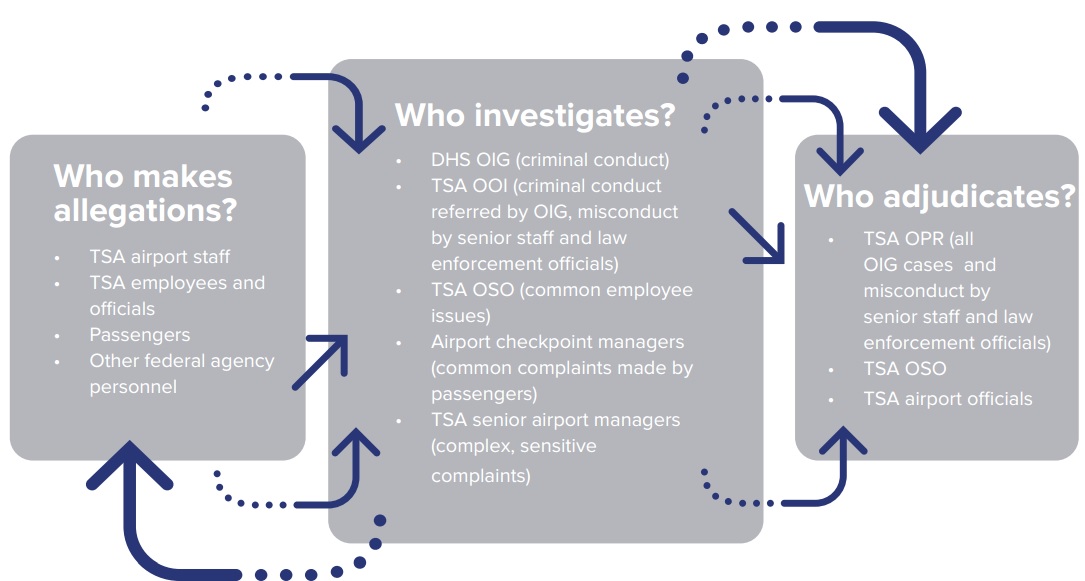Whenever confronted with a parade of horribles of TSA employee abuses, such as sexual assualts at screening checkpoints or agents who manipulate naked imaging devices so they can get a nude glimpse of passengers they find attractive, it’s blamed on the few bad apples who in no way undermine the hard work that thousands of men and women at the TSA do to keep us safe, day in and day out.
According to a new House Homeland Security Committee report, however, almost 27,000 of TSA’s 55,000 employees have received misconduct reports in the last 3 years. Only 6% of complaints result in disciplinary action. Unsurprisingly then — with disciplinary procedures not a real deterrent — complaints are up nearly 30% since 2013.
- “Almost half of TSA’s entire workforce allegedly committed misconduct, and almost half of that number allegedly did so repeatedly.”

TSA Agents in Charlotte Watch News of the TSA’s Failure to Detect Weapons and Bombs, Instead of Searching for Weapons and Bombs (HT: Tocqueville)
The issue is hardly new.
[I]n 2013, the U.S. Government Accountability Office (GAO) reported that misconduct by TSA employees increased by almost 27% from fiscal year 2010 to 2012, and that TSA did not have the processes in place to adequately address it.
In fact, not only aren’t there adequate processes in place to deal with problem employees, the processes that do exist are costly and used to cover up problems rather than weed out problem employees.
- TSA frequently pays to relocate offending employees.
- TSA managers use the threat of mandated employee relocation to deter reports of misconduct.
[N]umerous individuals came forward to the Committee alleging that senior TSA officials used the practice of directed reassignments, or mandated employee transfers around the country, as, in some cases, retaliation for employees elevating security concerns
Heard of three strikes? Nearly 5300 TSA employees — nearly 10% of the workforce — has received 3 or more complaints since 2013. 1270 have been cited 5 or more times. Some have even received more than 10 times.
There are varying levels of seriousness to the misconduct of course.
One TSO was caught accepting bribes in exchange for smuggling foreign nationals through a TSA-regulated checkpoint into one of the nation’s largest airports.
…Based on data provided by TSA, allegations of employee misconduct have increased substantially over time, despite the agency’s attempts to address unacceptable behavior.
Misconduct allegations related to TSA employees involve a variety of offenses ranging from unexcused absences to serious criminal activities, such as bribery and drug smuggling.
According to information provided by the DHS OIG, TSA employees have been criminally charged for using cocaine on the job, facilitating large scale drug and human smuggling, and engaging in child pornography activities.

The worst violations we know about have come from other agencies when a TSA employee interviews for a job elsewhere in the federal government.
CBP reported to the DHS OIG that one TSA employee admitted to selling and using drugs, accepting bribes, engaging in prostitution, and being involved in a credit card scheme during the course of a pre-employment polygraph and interview.
The U.S. Postal Inspection Service reported to the DHS OIG that another TSA employee
admitted to participating in the production, possession, and distribution of child
pornography; abuse of an animal; and shoplifting.
In fairness these two cases are not indicative of misconduct reports generally. But they’re indicative of how the TSA fails to uncover employee disciplinary issues on its own.
The Homeland Security Committee report documents the process for investigation and review of complaints, and the myriad ways that employees can dispute the agency’s findings. Concerningly, “[w]hile the number of employee misconduct complaints has increased over time, TSA has investigated fewer of them.”

What’s more, when they do investigate, punishments have gotten less severe.
From fiscal year 2013 to 2015, TSA increased the use of non-disciplinary
actions by almost 80%, while it decreased the use of disciplinary and adverse actions by 14% and 23%, respectively. As a result, TSA has offered fewer and lesser punishments and, instead, has provided more counseling and letters that explain why certain behaviors were not acceptable.
The Committee found that the TSA disciplinary process is so convoluted that the TSA’s ‘Misconduct Industrial Complex’ limits its ability to respond to problems. In fact, the TSA doesn’t even review its own data on misconduct allegations that employees enter into the agency’s own database designed to allow it to identify trends. The TSA responds that this is ok, because while it is allowed to review this data there is no requirement for it to do so.
There’s a way to fix this mess. As I wrote last month,
- The TSA performs badly, has for years, and is not getting any better.
- Separating oversight from provision of services is better for security, efficiency, and customer service.
- And all we have to do to see it — not just in other elements of government activity but even directly in screening — is look at airports that have screening companies, here in the U.S., in Canada, and in Europe.
(HT: Skift)


It’s all because of that anti-white racist head of Homeland Security, Jeeeeeeeehh Johnson. Did anyone think any differently under Obama and his sorority?
The problem is that half of the TSA employees aren’t even qualified to work at your local Mcdonalds. TSA is by far the biggest waste for taxpayer money.
Why isn’t the title of this post, ‘49% of TSA Employees Have Been Accused of Misconduct; 24% Have Been Accused Multiple Times’?
To play devil’s advocate, though, the job of TSA employees can only be neutral or negative to travelers. They don’t really work in a customer service industry. They also interface with hundreds if not thousands of individuals per day, so getting complaints would seem to be an expected part of the job.
@Peter these aren’t just traveler complaints, these are from other employees and other government agencies too
@Gary Without an accurate breakdown of at least the source of these complaints, your numbers are useless.
It’s almost like saying that since last year six Texas bloggers were arrested for child porn that Gary is a nonce and Texas bloggers should all be shut down.
this is nothing….. As a formal AFSD I can surely say that it far worse than reported, on so many levels. See what the lack of qualified leadership can do to an Agency.
Gary you have no idea what you’re writing!! How about you get qualified sources before writing this nonsense!! Story goes from AA breaching security to TSA is garbage!! You’re garbage because TSA has kept the traveling public safe through furlough after furloughs and now COVID!! Of course there’s bad apples in agency but look how many employees! You just want to write garbage so you can get a paycheck!! You’re not any different!! Have some integrity.
One airline pilot told me they’re known among his peers as “Thousands Standing Around.” The idea of a negative mission–finding the worst rather than helping those in need–would wear down any decent person. And just what kind of people would even want to do such work to begin with? Then too there there’s mission creep, like confiscating “too much cash” because it “might” indicate criminal activity. The whole business needs to be rethought, starting with closing the routine use of the chambers of horrors that no American should be subject to without cause.